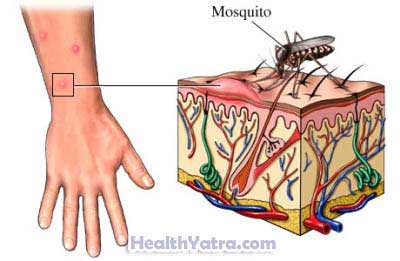Definition
West Nile virus (WNV) is an infection that is most commonly spread by a mosquito bite. In rare cases, WNV can lead to serious complications and even death.
This infection is found worldwide. In the United States, it tends to occur during late summer and early fall.
Causes
West Nile is caused by a virus. The virus is passed through the bite of an infected mosquito. The virus can also be passed through a blood transfusion with infected blood, but this is rare.
Risk Factors
The greatest risk factors for WNV are spending time in areas where mosquitoes are present and not using insect repellent. The risk of complications with WNV is highest in people:
- Over 50 years old
- With a weakened immune system

Symptoms
Most people with WNV have no symptoms. About 20% of the people who become infected with WNV develop flu-like symptoms such as:
- Fever and chills
- Headache
- Muscle pain
- Nausea and vomiting
- Diarrhea
- Rash
- Swollen lymph nodes
- Eye inflammation (conjunctivitis)
Symptoms may appear within 2-6 days and can last from a few days to several weeks.
A small number of people with WNV will develop serious, neurological symptoms. These symptoms may include:
- High fever
- Headache
- Stiff neck
- Disorientation
- Stupor
- Tremors
- Vision loss
- Severe muscle weakness
- Paralysis
- Coma
These serious symptoms need immediate medical care.
Diagnosis
In addition to taking your medical history and doing a physical exam, your doctor will ask you:
- What kind of symptoms you are experiencing
- Where you have been living or traveling to
- Whether you have been exposed to mosquitoes
A blood test is commonly used to confirm the diagnosis of WNV. Depending on the symptoms that you have, your doctor may order other tests, such as:
- MRI scan—a test that uses magnetic waves to make pictures of structures inside the head
- Analysis of fluid that surrounds the brain and spine
Treatment
Treatment for WNV focuses on supportive care. Depending on your symptoms your doctor may recommend:
- Pain relieving medicine
- Medicine to reduce nausea and vomiting
If you are dehydrated, you may need to drink an oral rehydration solution or have fluid delivered through an IV.
Treatment for severe symptoms may include:
- Mechanical ventilation (breathing support)
- Medication to control seizures
- Medication to decrease brain swelling
Prevention
The best preventive measure is to avoid mosquito bites. Prevention steps include:
- Avoid outdoor activities at dawn or dusk.
- Wear long pants and long-sleeve shirts when outdoors.
- Use an insect repellent with DEET.
- Repair screens to prevent mosquitoes from entering the house.
- Remove standing water to prevent mosquito breeding. Empty items like bird baths and gutters around your house.
Mosquitoes pick up the WNV by biting infected birds. If you see a dead bird, call the public health department. Do not touch the dead bird unless you are wearing disposable gloves.
